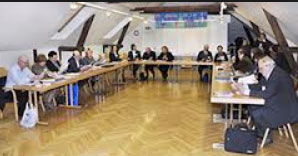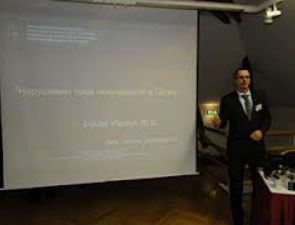- 2012/12/18
The European Foundation of Human Rights (EFHR) on international conference in Latvia.


On the occasion of the Human Rights Day and the 20th anniversary of the creation of Latvian Committee of Human Rights in Riga (LHRC) the conference entitled “The rights of citizens in baltic countries. The experience of the protection at international level.” was organized. LHRC has asked EFHR to present the situation of national minorities’ rights in Lithuania and to get the participants acquainted with its activity and finally, to share with them the experience in the field of protection of the minorities’ rights before the European Court of Human Rights and with a help of institutions of European Union.
The main aim of the conference was to present the situation of national minorities in baltic countries and to strengthen the legal framework for social integration with the aid of the Framework Convention for the Protection of National Minorities, the European Charter for Regional or Minority Languages and the Convention against Discrimination in Education.
Such organizations took part in the conference: the Moscow Bureau for Human Rights (Russia), the University of london (UK), Legal Information Centre for Human Rights (Estonia). Lithuania was represented by the European Foundation of Human rights and the Baltic Countries Association for Cultural and Historical Heritage of Slavs.

What is interesting, the participants of the conference were surprised by the statistics presenting the situation of national minorities in Latvia. 10 368 out of 50 025 Poles living in Latvia do not have Latvian citizenship. Up to 362 951 out of 598 484 Russians are stateless whereas as many as 18 494 out of 53 636 Ukrainians have a stateless status (for more information please see: www.pmlp.gov.lv/lv/statistika/dokuments/2012/Latvija_TTB_VPD_010712.pdf). It means that hundreds of people living in Latvia do not have any political rights, nor the access to most professions.
Therefore, the authorities of the countries that border on the Baltic Sea shall submit to the recommendations of the European Commission against Racism and Intolerance and they shall ratify the European Charter for Regional or Minority Languages, the European Convention on Nationality, the European Convention on the Participation of Foreigners in Public Life at Local Level, the International Convention on the Protection of the Rights of All Migrant Workers and Members of Their Families, and the protocol number 12 of European Convention on Human Rights, which fights against discrimination.
EFHR
Translated by Bartłomiej Cichoń within the framework of a traineeship programme of the European Foundation of Human Rights, www.efhr.eu



